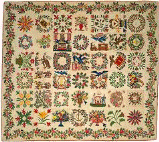Textile Society of America

Textile Society of America: Symposium Proceedings
Date of this Version
9-2012
Document Type
Article
Citation
Published in Textiles and Politics: Textile Society of America 13th Biennial Symposium Proceedings, Washington, DC, September 18- September 22, 2012.
Abstract
This paper considers how the intersection of religious ideology, gender, culture and history affect the role Muslim women in QuÈbec navigate for themselves in a society suspicious of veiling. QuÈbec's proposed niqab ban is the latest in a series of events spotlighting the friction between the province's avowed secular policy and its residents for whom religion is not a private practice. When Muslim women wear their veils in public, many QuÈbecois perceive this as a hostile practice directly confronting their "secular values" of equality and liberty, and a symbol of repressive social values and structures. While this is a common debate throughout the Western world, QuÈbec has a unique history underwriting these events. Les QuÈbecois are a minority in the predominantly Anglophone Canada, who are fiercely proud and protective of their culture and language. This heritage is older than the nation itself, and these rights were enshrined when Britain gained control of New France. This past is very much present in the lives of modern QuÈbecois, and is further influenced by the Quiet Revolution of the 1960s (in which QuÈbec overthrew centuries of Catholic hegemony in favour of a secular state). Canada's official federal policy of multiculturalism is a direct response to Francophone language and culture. But does QuÈbec's hostility toward public displays of Islam, and its associated oppressive religious rule, accurately reflect these Muslim women's lived experiences? And do these women understand the Francophone cultural context in which they live? Or, are both sides blinded by the veil?


Comments
Copyright 2012 by the author(s).